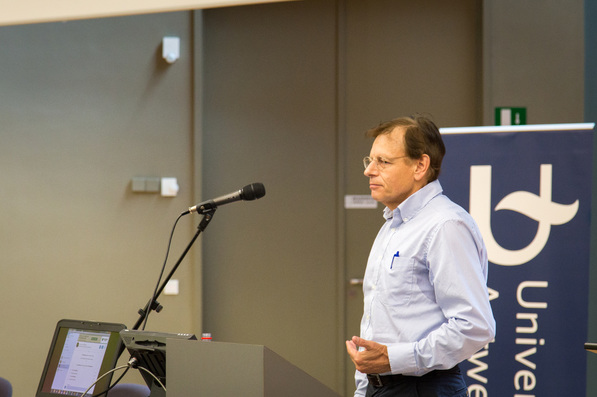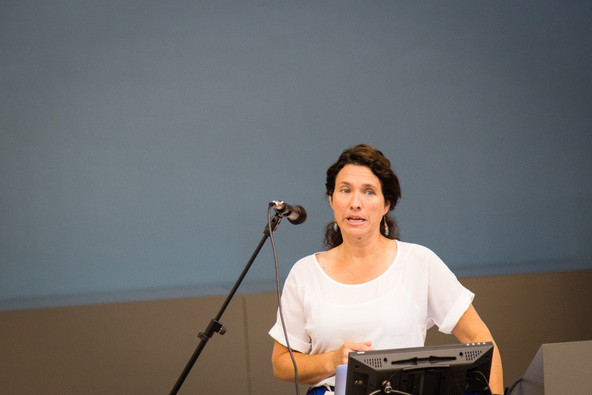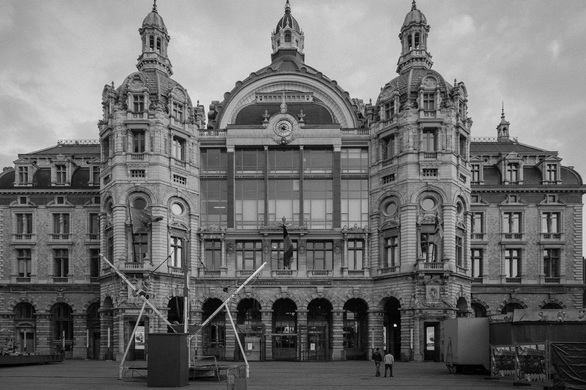One of the best things about working in academia are the conferences; talking to peers about research is inspiring and always leads to new ideas. But there are conferences, and then there are conferences, and the International Pragmatics Conference (or IPrA for short) is absolutely one of a kind. Held once every two years it attracts hundreds of scholars from all over the world, who in the course of six days present their work, meet up with old friends, and enjoy a drink or two. It was to be my first major conference, and as I was presenting a year of work, I both looked forward to it and dreaded it.
This edition of the conference was to be held in Antwerp. Fortunately, because it would mean relatively low expenses and a short travel time; or so I had hoped. The trip to the conference was a major operation. Because the first keynote on Sunday would start at 14:00h. it made sense to me to travel on Saturday, and fate would have it that the Netherlands would be struck by a summer storm on that day. Not only were a lot of the roads inaccessible, plenty of train tracks got hit by falling trees, which meant extensive detours and large delays. A trip that should have taken less than four hours, ended up taking more than seven; but this investment turned out to be well worth it.
This edition of the conference was to be held in Antwerp. Fortunately, because it would mean relatively low expenses and a short travel time; or so I had hoped. The trip to the conference was a major operation. Because the first keynote on Sunday would start at 14:00h. it made sense to me to travel on Saturday, and fate would have it that the Netherlands would be struck by a summer storm on that day. Not only were a lot of the roads inaccessible, plenty of train tracks got hit by falling trees, which meant extensive detours and large delays. A trip that should have taken less than four hours, ended up taking more than seven; but this investment turned out to be well worth it.
So much to learn
After a lovely sunny morning, the conference got under way with no less than three speeches to bid everyone welcome. After we were bored to tears with information about the city of Antwerp and the number of yearly publications of its university, things could get under way. And they did with a bang. We had the privilege of listening to none other than Stephen Levinson, director of the MPI for Psycholinguistics in Nijmegen and all-around genius. For forty five minutes he talked about the origins of language and the turn-taking system for conversation. He made the case that turn-taking, and by extension conversation, functions at the very limit of our cognitive abilities. Unfortunately, due to the tight schedule, there was no real time for questions. Particularly fun was also the talk by Gunter Senft, who took us on a trip down memory lane, showing the research he’d done over 30 years of field work on the Trobriand Islands in Papua New Guinea, and the way in which their society has changed since then.
On Monday the conference would really get under way with the panels and lecture series, where us common folk would present our work. But with a conference the size of IPrA, choosing where to go is not so easy. At each moment there were up to nineteen parallel sessions with talks on everything to do with pragmatics: from humor to politeness, and from relevance theory to film discourse. I decided to start with the conversation analysis lecture series with a talk on responses to questions in Russian (Galina Boden – Rutgers University). During the rest of the week, I got to learn about how people deal with lapses in conversation (Elliott Hoey – MPI), how response tokens help structure story telling in psychotherapy (Alan Zemel – University at Albany), how gestures are used by people at counters of bakeries in France and cheese shops in Italy (Lorenza Mondada – University of Helsinki), and so much more. In five days I attended about 60 talks from people all over the world. The blank notebook I brought was put to good use.
My own talk was on Tuesday. I was part of a panel of twelve talks on change-of-state, terminology coined by John Heritage in a paper in 1984. This means that we all discussed ways in which people claim that they just underwent some change in their mental state, such as knowledge, understanding, or attention. In Dutch this is typically done with oh, but there were talks on other languages such as Estonian and Japanese. With an audience of about forty people, it was a great experience (I even made the rolsi Twitter feed). It got a bit crowded towards the end though, because John Heritage himself was to speak. Over a hundred people wanted to listen, but the room could only seat 65, so some had to stand or even wait outside. You don’t have to become a musician to have scores of fans.
My own talk was on Tuesday. I was part of a panel of twelve talks on change-of-state, terminology coined by John Heritage in a paper in 1984. This means that we all discussed ways in which people claim that they just underwent some change in their mental state, such as knowledge, understanding, or attention. In Dutch this is typically done with oh, but there were talks on other languages such as Estonian and Japanese. With an audience of about forty people, it was a great experience (I even made the rolsi Twitter feed). It got a bit crowded towards the end though, because John Heritage himself was to speak. Over a hundred people wanted to listen, but the room could only seat 65, so some had to stand or even wait outside. You don’t have to become a musician to have scores of fans.
Another highlight was the keynote on Wednesday morning by Tanya Stivers from the University of California at Los Angeles. She decided to tackle the question of whether conversation is a system that is built for two. While the question may seem trivial, and indeed the outcome did not come as a surprise, the point was well worth making and her arguments were elegant in their simplicity. First she showed that the turn-taking system has a bias towards dyadic conversation; a speaker in 90% of the cases selects one and not multiple respondents. Second she showed that sequence structure works best with two; even when there are more people in the conversation, an action makes relevant only one response and more is even problematic. And finally she made the point that gaze can only every be directed at one other person. Conversation is thus indeed built for two, and it takes work to incorporate others. From that we learn that our communities and society are built on dyads, on relations between pairs of humans. It was inspiring.
Educational and social
Of course, conferences are a great place to catch up with friends and meet new people, and it’s been a long time that I’ve had to introduce myself so often and learn so many new names – remembering names is not my strong suit. On the first day already, I got to meet and eat with a lot of people from Max Planck and UCLA, including the aforementioned Stephen Levinson and Tanya Stivers. During the rest of the week I met up with researchers from all over, including some old – is it old when I left only a few months ago? – friends from York; John Heritage, who was kind enough to take some time to talk to me about my research; and lots of other people from all of academia, from Leiden to Texas. It keeps surprising me how open and friendly all these people are, no matter their stature. Everyone is there to share and learn. Academia can really be a great place to work.
Still, despite all the fun, it’s just as well that the conference is over. With so many talks and new faces, I suffer from a bit of cognitive overload. And while there were no late-night parties, I still did not get my regular beauty sleep. By Friday, my daily coffee diet had tripled. Luckily, the final day also had a panel on one of my favorite topics – action ascription – so that I had good reasons to stay awake. One talk had to be read from paper unfortunately, beacuse the speaker had had visa problems, and during this talk I realized that the final two keynotes were going to be a bridge too far. So I was happy to join my supervisor on the train trip back home, feeling tired but on an intellectual high. I’m already looking forward to the next conference in Belfast in 2017, now to figure out something to talk about.
Still, despite all the fun, it’s just as well that the conference is over. With so many talks and new faces, I suffer from a bit of cognitive overload. And while there were no late-night parties, I still did not get my regular beauty sleep. By Friday, my daily coffee diet had tripled. Luckily, the final day also had a panel on one of my favorite topics – action ascription – so that I had good reasons to stay awake. One talk had to be read from paper unfortunately, beacuse the speaker had had visa problems, and during this talk I realized that the final two keynotes were going to be a bridge too far. So I was happy to join my supervisor on the train trip back home, feeling tired but on an intellectual high. I’m already looking forward to the next conference in Belfast in 2017, now to figure out something to talk about.



 RSS Feed
RSS Feed
